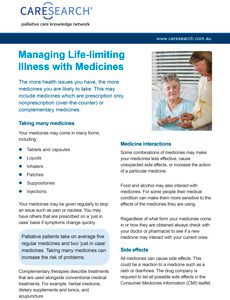One of the goals of palliative care is to help people live their life comfortably and as fully as possible. A key part of doing this is understanding what it means to have a life-limiting illness so that you can make choices about your care that are specific to your goals and what is important to you.
Being told you have a life-limiting illness forces us to think about what this means for us and our families, friends, and significant others. There are many things to consider including:
- How are things likely to change?
- What do I want my quality of life to look like?
- How can I expect my illness to progress?
- Should I continue to work?
- How do I prepare for this?
- Who do I need to communicate with?
- What about our finances?
- What does my/our future look like?
- What is the meaning of my life?
- At this stage of my illness journey, what am I hoping for?
- What happens if I can no longer care for myself at home?
Some might dread the answers to these questions. It’s scary and dealing with uncertainty is uncomfortable. But we know that those who live well, in spite of their illness, are fully informed and are an active participant in their care and in planning for their future. They learn about the big picture of their illness; they plan ahead, and they receive care and live a life that matches their preferences, needs and values.
For more information
Care Search is a website that has been developed to provide trustworthy information about palliative care and offers factsheets and videos to help you contemplate these questions and others.
Read more on Care Search.
Managing life-limiting illness with medicines
One of the realities of living with a life limiting illness is that you are likely to have several medicines you need to take. You may take medications on a regular basis to help manage issues like pain or nausea. You may also be prescribed medicines just in case your symptoms change quickly. Navigating these medicines, including medicine interactions and side-effects, along with managing the cost, can be tricky. Care Search offers some practical ways to help you manage your medicines.


